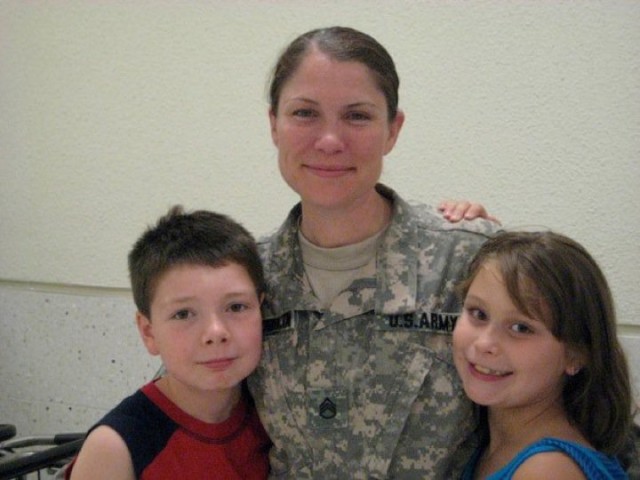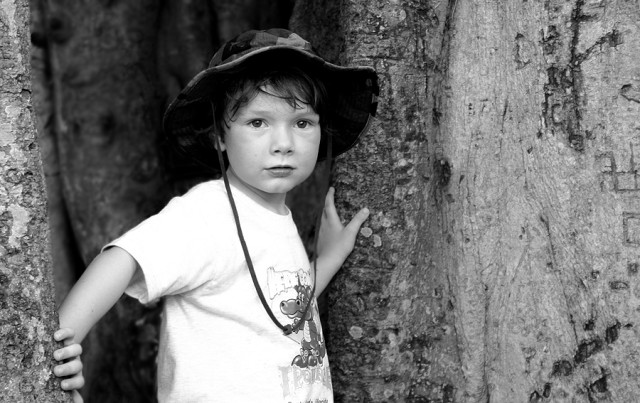FORT HUACHUCA, Ariz. -- According to my "chickadees" - my daughter Hana and my son Devin - being a military child can be "pretty cool." World travels, a diverse group of friends and a mom or dad (or both) who wear the uniform every day, are all normal in their eyes. Some of their friends think it's a bit exotic. Hana loves telling people that she was born in Lich, Germany, and is proud of having seen so much of the world by 9 years old.
On the other side of that coolness coin, there are some challenges and difficulties military children experience that their peers from civilian families just don't have to face. Frequent moves and multiple deployments are a fact of life in our modern military, and that can be both good and bad. My children are always initially excited about moving to a new place, but as the date approaches, reality sinks in and they realize with much sadness, they have to say goodbye to their friends.
This is difficult for any child, but it is especially so for Devin, who at 11 years old, still does not befriend his peers very easily. Children his own age take a long time to warm up to him - if they do at all - because they see him as an "odd duck" or just much too different than everyone else. When he does make a friend with someone his age, it is a really big deal in our house.
In addition to moving away from their friends, the teachers they love and respect, and the community they know well, they have to begin from scratch in the new town, make new friends, meet new teachers, learn new rules, and go to a new school. This wouldn't be so bad if school districts across the nation had the same standards and curricula, but they don't. The children often have to either play "catch-up" or revisit subjects they have already learned. Sometimes they will miss a subject entirely, because their new school taught it in an earlier grade.
Then, we have what I call "the autism factor."
When we first arrived to Fort Hood, Texas, from Fort Lee, Va., we thought it was going to be just like all of our other permanent changes of station. In reality, it was very different for several reasons. I was moving my family alone because their father and I just legally separated. He was deploying again while I went into the Reserves from active duty. I received PCS orders for Texas and had to report one week from receipt of the orders. A lot of big things were happening in their little lives, all at once.
The movers packed the house the day classes resumed from spring break, so when they got home, everything was in boxes. The next day, they said goodbye to all of their friends at school and then came home to an empty house. We hit the road late that night and began the long road trip to Texas in our car that was packed-to-the-gills with suitcases, our confused cat and a cooler full of food.
It was our roughest PCS move to date, but things eventually happened when they needed to happen. My chickadees loved their new school and teachers; I loved my new unit and being back in uniform full-time; and we found the perfect house for our family.
Everything seemed to be falling into place until my son - my beautiful, sensitive, intelligent, quirky and sweet 7 year-old baby boy - had a violent, emotional breakdown at school one day, just weeks after our arrival. Even as I write about it four years later, it stings my eyes and makes me pause.
I was told to take him to the off-post emergency room because that particular hospital had the best psychiatric facility for children in our area. After several very long hours in the ER and a painfully emotional and exhausting intake interview, they admitted my son into the children's psychiatric ward for evaluation and observation, a process that lasted nearly a week.
When told his diagnosis, my ears started ringing and my world came crashing around me as my heart broke for my son. I never felt so alone, inadequate and helpless as a parent in my life. In that same moment, I was painfully aware that Devin was tucked-away in a locked room in that hospital, feeling terrified and alone, too.
That began a two-year string of changes: weekly counseling appointments, family therapies, occupational therapies, several individualized education plans, four schools, five childcare providers, and an ill-equipped school district that didn't know anything about Asperger's syndrome, an autism spectrum disorder.
With help from the staff at the Fort Hood Exceptional Family Member Program office and the emotional support of my brigade chaplain and my local Army family, my children and I made it through the toughest period of our lives.
Before my family's crash-course introduction to Asperger's syndrome, I knew very little about autism and the many variants, but I became educated very quickly. I learned that it is estimated that one in every 110 children are diagnosed with an ASD*, making it more common than childhood cancer, juvenile diabetes and pediatric AIDS combined. Even more daunting, it is 4-to-5 times more likely to occur in boys than girls* and in the United States alone, one in 70 boys are diagnosed!
Even today, the numbers are staggering to me. How did I not know this' How had I never heard of it before' Well, now I do know, and I made it my personal mission to raise awareness, support autism research and learn as much as I can, in order to provide a full and happy life for my son.
For the past two academic years while I was deployed, my children have been living with their father. Devin has been attending a school for autistic children. As we prepare him for the move to Sierra Vista, the teachers and staff of Northwestern Human Services Autism School in Carlisle, Pa., are in the process of transitioning him to a mainstream school by sending him to the elementary school nearby for a few classes a week.
The transition to Sierra Vista will be difficult, but nowhere near as difficult as what we experienced in Texas. We have some things going for us this time. We know Devin has Asperger's; we have a strong and efficient IEP; we have plenty of time to prepare him for these big, upcoming changes; and more importantly, Devin has one of the many great traits common among military children: resilience.




Social Sharing